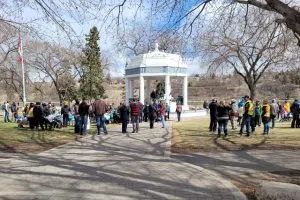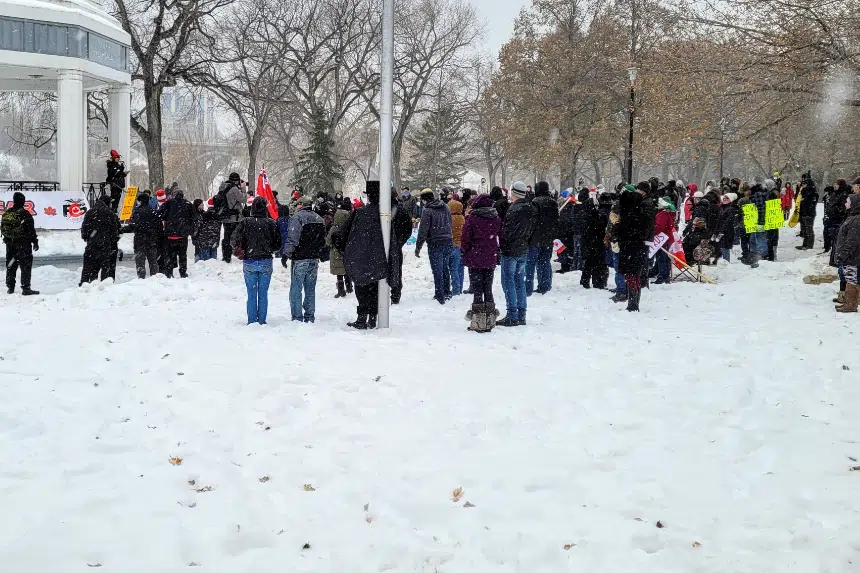Ticketing at Saskatchewan “freedom” rallies has sparked conversation around why only certain individuals receive fines and court dates.
With COVID-19 changing the way the law system works in Canada, it has left some grey area for justice, according to Saskatchewan criminal lawyer Brian Pfefferle.
“If you were to, for example, cordon off a 200-person event and charge all 200 people, there may be a public outcry saying, ‘We’re using public resources (and) we’re using court systems to charge all these individuals and that’s an unnecessary use of resources,’ and that 200-person rally could turn into a 2,000-person rally next time,” Pfefferle said.
“Charges need to be laid if a law is to be considered serious and valid. But how many people need to be charged? It’s more than symbolic to charge one or two people. It suggests that if you’re doing some activity, you’re at risk to potentially be charged and it has a deterrence impact.”

More than 120 people gathered at Kiwanis Park for what was advertised as a children’s freedom rally on April 24, 2021. (Keenan Sorokan/650 CKOM)
The rally in question was held in Saskatoon on Saturday. The “Freedom Rally,” which was directed at children, had more than 100 people in attendance. Saskatoon police have not announced any charges, but told 650 CKOM that they are “anticipated.”
Police also added that in the past, ticketed individuals have ranged from organizers of the events to those who have displayed egregious behaviour, such as spitting or violating a bystander’s personal space.
“Each investigation has slightly different circumstances,” said Alyson Edwards, director of public relations with the Saskatoon Police Service.
Pfefferle said creating and maintaining a balance is difficult to meet for not just police officers, but also the justice system. He said there will always be critics on all ends of decision-making, but discretion is a part of all law enforcement mechanisms.
“I can appreciate the difficult task that police and public health have when they’re trying to encourage compliance (and) at the same time not wanting to (promote) or create any significant resistance to these laws,” he said.
Pfefferle said the COVID-19 public health orders are “clearly” enforceable law. What the public wants to see, in his eyes, is compliance — not punishment.
“It’s unquestionable and indisputable that there are certain freedoms (that) have been impacted by COVID-19: Freedom of assembly (and) freedom of movement. There are various rights and freedoms that are impacted by these rules — the issue is whether it’s justified in our society in light of circumstances,” Pfefferle said, before explaining some may misunderstand that.
The question will be posed to the court, if it’s a reasonable limitation on those rights. Pfefferle said it will be up to the Crown to prove that the rules are justified.
That may be medical evidence, such as ICU numbers, hospital intake, people who may have been infected at the rally, how COVID spreads and how public health measures are reasonable limitations on the public.
At the same time, Pfefferle explained some individuals may not be deterred by nominal fines, and they make their decisions to participate or to not participate. In the end, it’s more of a challenging of the laws.
More grey area also came when children became involved, according to the lawyer.
“One could argue that that was quite a significant risk for those kids,” Pfefferle said. “At the same time, those young kids have been impacted by COVID-19 to a degree many of us will never be able to understand in terms of socialization and schooling, and the like.”
He adds people in society just want to see the pandemic in the rearview mirror. Experts say the rallies themselves are unsafe, but the balance needs to be reached by all parties involved.
Pfefferle said the idea of 200 constitutional challenges coming to the justice system would grind the system to a halt. It also ties up individuals who deserve their day in court to clear their name, or get their side of the incidents shown.
Attendance at ‘freedom’ rallies following isolation orders
Another aspect at play Saturday in Saskatoon was the Prince Albert rally held a week to the day prior. A risk of exposure release was tied to the event, which meant all attendees needed to legally self-isolate and call their doctors or HealthLine 811.
Pfefferle said following social media posts which indicated individuals would be flouting the order to attend Saskatoon’s rally, the question of “criminal negligence” as a reasonable charge was brought up online.
“There’s a difference legally between those types of charges,” he said. “Those types of criminal charges are ones that can be very difficult to prove, to suggest that they can be proven beyond a reasonable doubt when we talk about the risk of COVID-19 being spread, and the subsequent risk that it may cause serious harm and the percentages of that.
“If someone was to obtain COVID-19 from this event, it would be incredibly difficult to prove where they got it from … It would be a real uphill battle to lay actual criminal charges.”
Pfefferle said there is a stark difference between advisable and criminal behaviour when dealing with the charges. When it comes to publicly flouting public health orders, that could become useful during the criminal matter.
He said the heightened hypothetical probability of someone being infected is there, so “there could be an argument” in court.
Multiple charges, as well, to one particular individual could end up hurting their court battle.
“It would not surprise me if multiple violations would be treated incredibly seriously by a court and that, as a result, the fines would escalate and increase using a stair principle,” he said.







